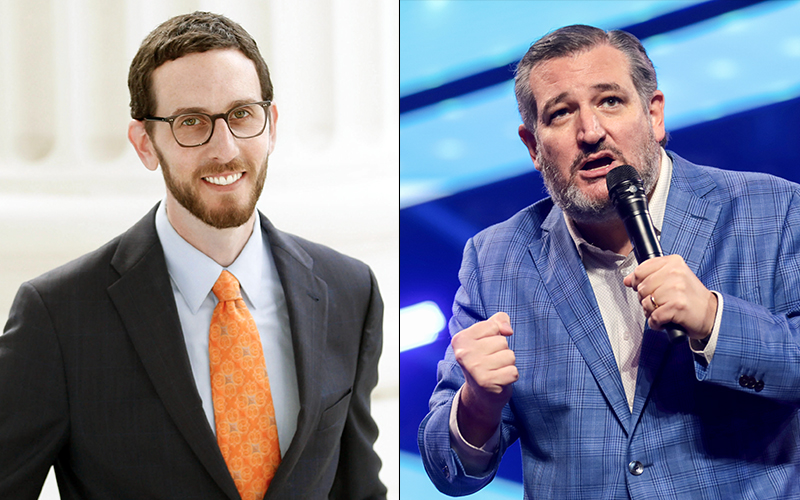California senator yanks bill to ban genital surgeries on intersex infants
Intersex advocates argue that surgery may not be needed for some individuals, and should be delayed until the patient can consent.
By John Riley on January 27, 2022 @JRileyMW

A bill in California that sought to ban unnecessary genital surgeries on intersex individuals has been defeated for the legislative session, after the bill’s sponsor withdrew the bill earlier this month.
Sen. Scott Wiener (D-San Francisco) pulled the bill, titled the “Intersex Bodily Autonomy, Dignity and Choice Act,” after it became clear that the measure did not have the requisite votes to be approved by the Senate Business & Professions Committee and advance to the floor of the upper chamber.
The bill would have banned doctors from performing medically unnecessary, irreversible genital surgeries on intersex infants and other young children, delaying any surgical interventions until later in life, when the intersex child can consent to making an informed decision about their own body.
For decades, doctors have performed surgical interventions on intersex youth — those born with sex characteristics that are ambiguous or do not fit neatly within the gender binary — often rushing to assign a gender and perform surgery out of fear that intersex children will suffer psychologically and socially if they cannot conform to gender-specific norms or stereotypes. But surgery is actually necessary in rare instances, such as when a child can’t urinate properly.
An estimated one to two percent of people are born with variations in their genitalia and sex anatomy, some of whom identify as intersex. Parents of intersex children are often offered the chance — and sometimes even pressured by doctors — to pursue surgery in the name of making the child’s life easier, without necessarily taking into account the long-term ramifications of their decision.
Unfortunately, surgical interventions can actually lead to gender dysphoria and feelings that one’s body is incongruent with one’s assigned sex at birth, especially if the patient begins developing secondary sex characteristics that run counter to that, such as a person assigned female at birth who begins developing facial hair and larger muscles. As a result, intersex individuals may be forced to pursue additional surgery as adults to deal with the side effects of the one they were subjected to as adults. In some cases, those surgeries can also lead to complications such as sexual dysfunction, loss of sexual sensation, infertility, and even post-traumatic stress disorder.
Surgeries on intersex infants are banned in countries like Malta, Uruguay, India, Albania, Portugal, and Germany. In 2013, the United Nations’ Special Rapporteur on Torture called on nations to outlaw unnecessary genital surgeries on intersex individuals, calling in “tantamount to torture or cruel, inhuman or degrading treatment or punishment.” Three former U.S. Surgeons General have also called for intersex surgeries on infants to be banned.
Wiener’s bill, which has been backed by several LGBTQ advocacy groups, has been introduced in committee for three consecutive years, but has failed to emerge from committee due, in part, to a lack of understanding about intersex health issues, and in part due to intense lobbying from some medical associations, especially those representing the limited number of specialists in reproductive health and/or genital reconstruction surgeries.
“SB 225 was a basic civil rights law, standing for the important principle that people should be able to make decisions about their own lives, as opposed to having other people make those decisions for them,” Wiener said in a statement issued after withdrawing the bill. “These irreversible genital reconstruction surgeries — usually performed when a child with variations in their genitalia are infants — have lifelong consequences. These consequences can include chronic pain, scarring, loss of sexual sensation, and more.
“SB 225 is vitally important civil rights legislation for intersex people and the larger LGBTQ community, and I’m disappointed and saddened that it does not appear to have a viable path forward at this time,” he added. “Pausing medically unnecessary genital surgeries until a child is old enough to participate in the decision isn’t a radical idea. Rather, it’s about basic human dignity. I’m fully committed to protecting the rights of everyone with variations in their genitalia, including intersex people. I’m not giving up, and I stand in solidarity with the intersex community in its fight for bodily autonomy, dignity and, choice.”

Intersex advocates expressed disappointment at the bill’s failure.
“We are disappointed that California is not yet ready to lead on this important civil rights issue, and we will continue to work with intersex individuals and advocates to move the state forward towards recognizing the bodily autonomy of intersex Californians,” Becca Cramer-Mowder, a legislative coordinator and advocate with ACLU California Action, said in a statement.
“There is a growing recognition that non-consensual surgeries should be a thing of the past,” Alesdair Ittelson, director of law and policy and the interim executive director of interACT: Advocates for Intersex Youth, told Metro Weekly. “Unfortunately, there is still a small subset of physicians who continue to argue that they should be allowed to perform these interventions without the participation of the impacted individual. It’s the position of every major intersex-led organization that intervention should be delayed until and unless individual actually says that they want to have an intervention take place.”
While some medical associations, especially those representing specialists like gynecologists, andrologists, and urologists, have pressured lawmakers not to limit the types of surgeries they can perform, others are beginning to adopt the view that non-emergency surgical interventions should be delayed until intersex individuals are old enough to consent and understand the ramifications of the surgery. But many doctors, especially those belonging to older generations, have been trained since medical school to favor surgery for children born intersex and may not be as up-to-date on more recent developments regarding health care for intersex people.
“Pediatric urologists have for decades focused on interventions and infancy and childhood, and not, for example, full-life outcomes, and so the subspecialties responsible that are supposed to be protecting this population are actually committed to a model of pathologization, because we know, anecdotally, that there are lots of intersex people who are perfectly fine without interventions,” Ittelson said. “Although that’s changing, that’s not how folks practicing right now were trained.”
On the bright side, however, Ittelson noted that younger generations of physicians are increasingly moving closer to interACT’s position, with the American Medical Association Board of Trustees recommending that the AMA adopt a policy supporting a delay of all non-emergency procedures.
“Unfortunately, there was lobbying from the urological societies that ended up shelving that recommendation,” Ittelson said. “But just from speaking at medical schools or talking to folks on the ground who are being trained up now, there’s much more of a greater understanding that intersex individuals deserve the right to make these life-altering decisions for themselves. And as more and more people share their stories, I believe we’re going to see a shift in medical practice toward more affirming care.”
Scott Wiener to Ted Cruz: “Everyone Hated You” in Law School
Gay California State Sen. Scott Wiener claps back at Cruz for conflating him with a disgraced former congressman.
By John Riley on March 22, 2024 @JRileyMW
Ted Cruz found himself on the receiving end of a vicious barb after attempting to mock one of his critics online.
California State Sen. Scott Wiener (D-San Francisco), a gay lawmaker who is considered a possible contender for former U.S. House Speaker Nancy Pelosi's seat when she retires, slammed the Republican Senator on X for his interrogation of Adeel Mangi, who was nominated by President Joe Biden for a seat on the 3rd U.S. Circuit Court of Appeals.
If confirmed, Mangi would be the first Muslim appellate judge in the United States, but his nomination appears to be in jeopardy following a right-wing smear campaign portraying him as an anti-Semite.
Voters Remove School Board Members Who Pushed Anti-LGBTQ Policies
Residents of Orange, California, ousted two school board members who championed right-wing and anti-LGBTQ policies in a recall election.
By John Riley on March 22, 2024 @JRileyMW
Voters in Orange, California, successfully recalled two school board members accused of pushing anti-LGBTQ policies, including one that "outs" transgender students to their parents.
Madison Miner and Rick Ledesma, the former board president, lost recall elections for the Republican-leaning Trustee Area 4 and the Democratic-leaning Trustee Area 7, respectively.
Organizers behind the recall elections claimed that the two board members had pushed an aggressive, right-wing culture war during their time on the board.
While on the board, Ledesma and Miner championed a "parents' bill of rights" that allows parents to review curriculum and have their opinions considered by school district leaders. Critics say the bill is an attempt to ferret out books, lessons, teaching plans, or topics with which they personally disagreed.
California’s Huntington Beach Bans Pride Flags
Voters in Huntington Beach, California, approved an ordinance banning the LGBTQ Pride flag from flying on city property.
By John Riley on March 12, 2024 @JRileyMW
Voters in Huntington Beach, California, a Los Angeles exurb in Orange County, approved a measure last week to ban the Pride flag and any other non-governmental banners on city property. The move is part of a larger right-wing push against LGBTQ visibility.
While only 31% of registered voters showed up at the polls in this year's presidential primary, the primary ballot also featured Measure B, which sought to limit the types of flags displayed on government property. Nearly 58% of those voters endorsed the measure, according to county election results.
Moving forward, any flag representing a political or social cause, such as breast cancer awareness, a specific religion, or a specific community -- such as the LGBTQ community -- will not be permitted to fly on city-owned flagpoles.
Support Metro Weekly’s Journalism
These are challenging times for news organizations. And yet it’s crucial we stay active and provide vital resources and information to both our local readers and the world. So won’t you please take a moment and consider supporting Metro Weekly with a membership? For as little as $5 a month, you can help ensure Metro Weekly magazine and MetroWeekly.com remain free, viable resources as we provide the best, most diverse, culturally-resonant LGBTQ coverage in both the D.C. region and around the world. Memberships come with exclusive perks and discounts, your own personal digital delivery of each week’s magazine (and an archive), access to our Member's Lounge when it launches this fall, and exclusive members-only items like Metro Weekly Membership Mugs and Tote Bags! Check out all our membership levels here and please join us today!
The Magazine
-
Most Popular
 George Santos, Duped by NAMBLA Prank, Exits Race for Congress
George Santos, Duped by NAMBLA Prank, Exits Race for Congress  California Mayor Recalled After Coming Out as Transgender
California Mayor Recalled After Coming Out as Transgender  Grindr is Being Sued for Sharing HIV Statuses
Grindr is Being Sued for Sharing HIV Statuses  Conservative Ad Makes Case for Transgender Rights
Conservative Ad Makes Case for Transgender Rights  Judge Blocks Ohio's Anti-Transgender Bans
Judge Blocks Ohio's Anti-Transgender Bans  'Unknown Soldier' Makes for a Soaring Romance (Review)
'Unknown Soldier' Makes for a Soaring Romance (Review)  Trolls Hate on No. 1 NFL Draft Pick for Pink Phone and Nail Polish
Trolls Hate on No. 1 NFL Draft Pick for Pink Phone and Nail Polish  Gay Furries Hack Right-Wing Network Real America's Voice
Gay Furries Hack Right-Wing Network Real America's Voice  GLOW's Secret Garden Is An "Escape...With A Chill Vibe"
GLOW's Secret Garden Is An "Escape...With A Chill Vibe"  'The Human Museum' Puts Humanity on Display (Review)
'The Human Museum' Puts Humanity on Display (Review)
 'The Human Museum' Puts Humanity on Display (Review)
'The Human Museum' Puts Humanity on Display (Review)  George Santos, Duped by NAMBLA Prank, Exits Race for Congress
George Santos, Duped by NAMBLA Prank, Exits Race for Congress  Grindr is Being Sued for Sharing HIV Statuses
Grindr is Being Sued for Sharing HIV Statuses  Judge Blocks Ohio's Anti-Transgender Bans
Judge Blocks Ohio's Anti-Transgender Bans  D.C. Courts Pop-Up Businesses Ahead of WorldPride
D.C. Courts Pop-Up Businesses Ahead of WorldPride  Cher to be Inducted in the Rock & Roll Hall of Fame
Cher to be Inducted in the Rock & Roll Hall of Fame  Texas Governor Wants to Ban Trans People from Being Teachers
Texas Governor Wants to Ban Trans People from Being Teachers  For Don Mancini, Chucky is So Much More Than a Killer Toy
For Don Mancini, Chucky is So Much More Than a Killer Toy  LGBTQ Teen Sues School Over Suspension For Rap Lyrics
LGBTQ Teen Sues School Over Suspension For Rap Lyrics  California Mayor Recalled After Coming Out as Transgender
California Mayor Recalled After Coming Out as Transgender
Scene
Metro Weekly
Washington's LGBTQ Magazine
P.O. Box 11559
Washington, DC 20008 (202) 638-6830
About Us pageFollow Us:
· Facebook
· Twitter
· Flipboard
· YouTube
· Instagram
· RSS News | RSS SceneArchives
- "We use cookies and other data collection technologies to provide the best experience for our customers. You may request that your data not be shared with third parties here: "Do Not Sell My Data
Copyright ©2024 Jansi LLC.










